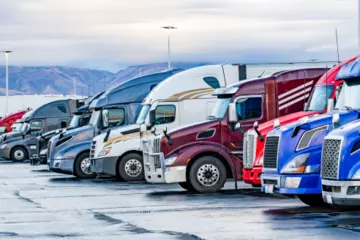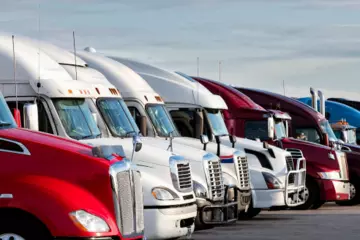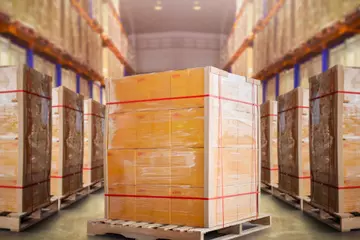Your guide to less-than-truckload (LTL) shipping
No matter how much experience you have planning and booking freight shipments, LTL might bring some processes you’ve never had to navigate before. This is because LTL involves unique details like freight class, and things like transit and handling may work differently than what you’ve seen with other modes.
With a little insight into how the service works and what you can expect, LTL shipping can be a great addition to your transportation plan.
The fundamentals
Start with the basics to understand when and why LTL shipping is a good option.
What is LTL?
LTL stands for less-than-truckload. It’s a shipping solution that combines freight from multiple shippers into one trailer, making it a cost-effective option for loads that are too large for parcel services but too small to fill an entire truck.
What type of freight ships LTL?
Less-than-truckload (LTL) freight typically weighs between 150 and 20,000 pounds and isn’t large enough to fill a full semi-trailer. This freight is usually palletized or crated for safer handling.
How does LTL shipping work?
LTL carriers move goods across the country by combining freight from multiple shippers into one trailer. Unlike full truckload shipping, where one shipment goes directly from origin to destination in the same trailer, LTL shipments travel through a network of service centers with other freight.
Here’s how it works for most carriers: a local driver picks up a shipment and takes it to a nearby service center. There, it’s combined with other freight headed in the same direction. This process repeats until it reaches a service center near the destination. A local driver then makes the final delivery.
How are costs determined?
LTL rates are based on the weight and dimensions of your shipment, its origin and destination, the freight classification, and any special services or equipment. Carriers can have varying rates depending on their current capacity and may charge differently for assessorials like liftgates and inside delivery.
How do I know if it’s right for my freight?
Your logistics provider can help you determine the right mode based on the shipment’s characteristics and current market conditions. But LTL is usually the best option for smaller shipments that don’t require exclusive use of the equipment.
If you’ve previously used parcel services, LTL may offer better rates, less damage, more handling options and reduced environmental impact.
Learn more about how LTL compares to parcel.
How do I know which carrier to use?
While there are things you should be looking for in any provider you work with, carrier selection for each shipment will depend on your priorities — whether that’s price, transit time, service area, specialized handling or reliability. Comparing these factors can help you choose the best fit.
How to ship LTL
Once you’ve determined that your freight is shipping LTL, you need to prepare it.
Know the weight, dimensions and class
Carriers need to know your freight's exact weight and dimensions since trailers have a set amount of space and a limit for how much weight they can hold. Correct measurements will reduce the risk for unexpected charges and help ensure your freight moves on schedule.
Providing the proper National Motor Freight Classification (NMFC) is another step. Class is determined by factors like density, value, stowability and handling. Read more about NMFC.
Package it correctly
Because LTL freight gets handled multiple times during transit and is loaded with other types of freight in the equipment, proper packaging is essential for keeping it intact and damage-free.
Everything from choosing the proper box, pallet or crate to using the right internal packaging can help keep freight safe. Use these LTL packaging tips to get started.
Get quotes and book a reliable carrier
If you’re booking a spot shipment, it’s a good idea to compare rates and services from different LTL providers to find the right fit for your freight. Remember to discuss any special services up-front so there aren’t any unexpected charges and talk through their processes to ensure your freight will be handled safely. The more communication you have during the quoting and booking process, the smoother your experience will be
Want to quickly compare rates and transit time options? Get an LTL quote with ArcBest.
Optimizing your strategy
Understanding how LTL shipping works is only half the battle. To keep your supply chain efficient and costs under control, you need a strategy that meets both business needs and customer expectations.
Here are some tactics to consider:
Use the right pricing. Combine different LTL pricing options, such as long-term agreements and spot market rates, to help manage costs effectively while maintaining flexibility.
Leverage technology. Use digital tools for creating and managing bills of lading (BOL), monitoring shipments and analyzing shipping data. This will simplify administrative tasks, reduce errors and speed up communication.
Review performance. Track on-time delivery rates, damage rates and customer feedback. Use these insights to refine your carrier selection and packaging practices.
Communicate clearly. Share shipment tracking details and proactively communicate any potential delays with solutions. By providing timely updates and options, you can improve customer satisfaction and strengthen relationships.
Looking for an LTL provider?
With more than 100 years of LTL experience, ArcBest is uniquely equipped to help you find the best option for your shipments. LTL service is available through our industry-leading LTL carrier ABF Freight® and our network of vetted LTL carriers.
With a full suite of other logistics solutions, we can help ensure your supply chain operates at peak efficiency — no matter which transportation mode you use.







